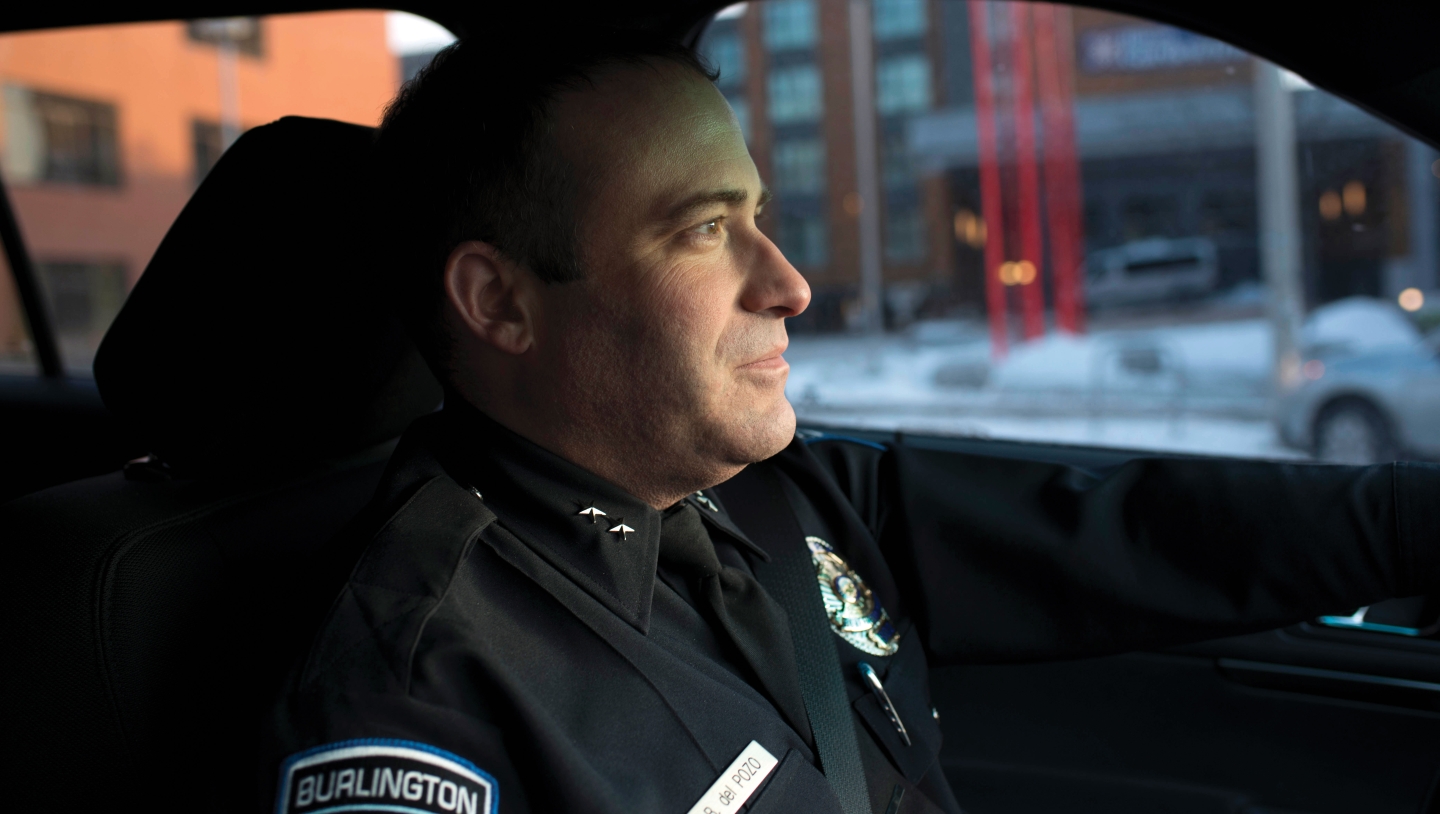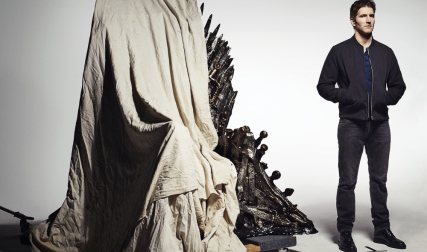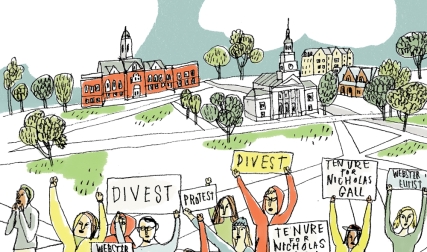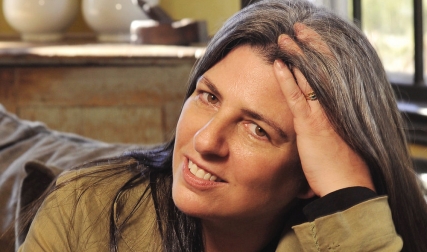When you think of cities on the front lines of policing initiatives in America, you may think of New York, Chicago or Los Angeles, where the police forces number in the thousands.
You don’t think of Burlington, Vermont—a city of approximately 40,000 located about 100 miles northwest of Hanover and 50 miles south of the Canadian border. But that didn’t keep Brandon del Pozo, an 18-year veteran of the New York City Police Department (NYPD), from taking the post as Burlington’s chief of police in 2015. He’s now transforming Burlington into a lab for innovative police initiatives, and emerging as a force in shaping the national conversation on policing and police reform.
Del Pozo majored in philosophy, served in the ROTC and was a member of Kappa Chi Kappa. While serving in the Army National Guard, he joined the NYPD to give back to his community at a time when homicides in New York City were at record highs. He rose from a patrol officer working the streets of Brooklyn to lieutenant in the intelligence division, investigator of police corruption and commanding officer of two precincts. Later he helped create the department’s office of strategic initiatives.
The 42-year-old may be one of the most educated cops in America. Del Pozo has a master’s in public administration from the John F. Kennedy School of Government at Harvard and a master’s in criminal justice from the City University of New York. He’s currently writing a dissertation to complete a doctorate in philosophy, also from CUNY.
That may partly be why del Pozo strikes visitors as so cerebral and deliberate, even when it comes to decorating. His office is filled with career mementos, including signs in Arabic from his time spent training police in Jordan, where he also responded to terrorist attacks to learn how to handle terrorism at home. (His oldest son’s name—Zane—is a popular name in Arabic that his wife, Sarah Carnevale, discovered when they lived there.) Also on display is the burnt page of a phone book that landed at his feet while he was on duty on 9/11.
“There’s no reason for complacency in American policing right now,” says del Pozo.
He has such a penchant for quoting philosophers and writers in his daily conversation that one wonders if he has a photographic memory. On the roll call room at the station is a quote from Sun Tzu: “To subdue your opponent without fighting is the highest skill”—a clear nod to the current national conversation on excessive force in policing, something that del Pozo is hoping to reform.
“He has always been more sensitive to national trends in criminal justice than other people in the field,” says Lt. Lucas Miller, who runs the NYPD incident prevention unit and who worked with del Pozo when he was the commanding officer of the 50th Precinct. “I think that’s partially because of his education but also because of his world outlook. He’s always looking at the larger picture. You can see that in the last few years with the current issues in American policing, but also in what it means to be a cop and protect the community. When most of us give a nuts-and-bolts answer, Brandon will give a more philosophical one.”
Del Pozo says he was drawn to the Burlington force because of its progressive leanings. “It’s a department that really embraced the use of technology,” he says. “They developed their own technology to track incident rates and had already hired an Oxford-trained crime analyst before I got here. They were one of the first agencies to adopt body cameras. I knew that this was an agency that had already made a commitment to improving policing. The ground would be really fertile for innovation.”
With 100 officers and 40 civilian employees, Burlington’s police force is large enough—about the size of a New York City precinct—to tackle the same kind of challenges larger cities face while implementing ideas more quickly, says del Pozo. Out of more than 15,000 police departments nationwide, Burlington is among the top 1,000 largest in terms of size, according to a report by the Bureau of Justice Statistics released in 2013. That means the department has enough resources to make meaningful, long-term institutional changes. Del Pozo has already made some strategic new hires, including a data analyst and opioid policy coordinator. “If we were smaller, we couldn’t do things like that,” he says. “And if you’re much bigger, it’s a real morass to institute change. To change the tide of the NYPD or Los Angeles Police Department or Chicago Police Department is extremely difficult. You can’t do that in a year or two.”
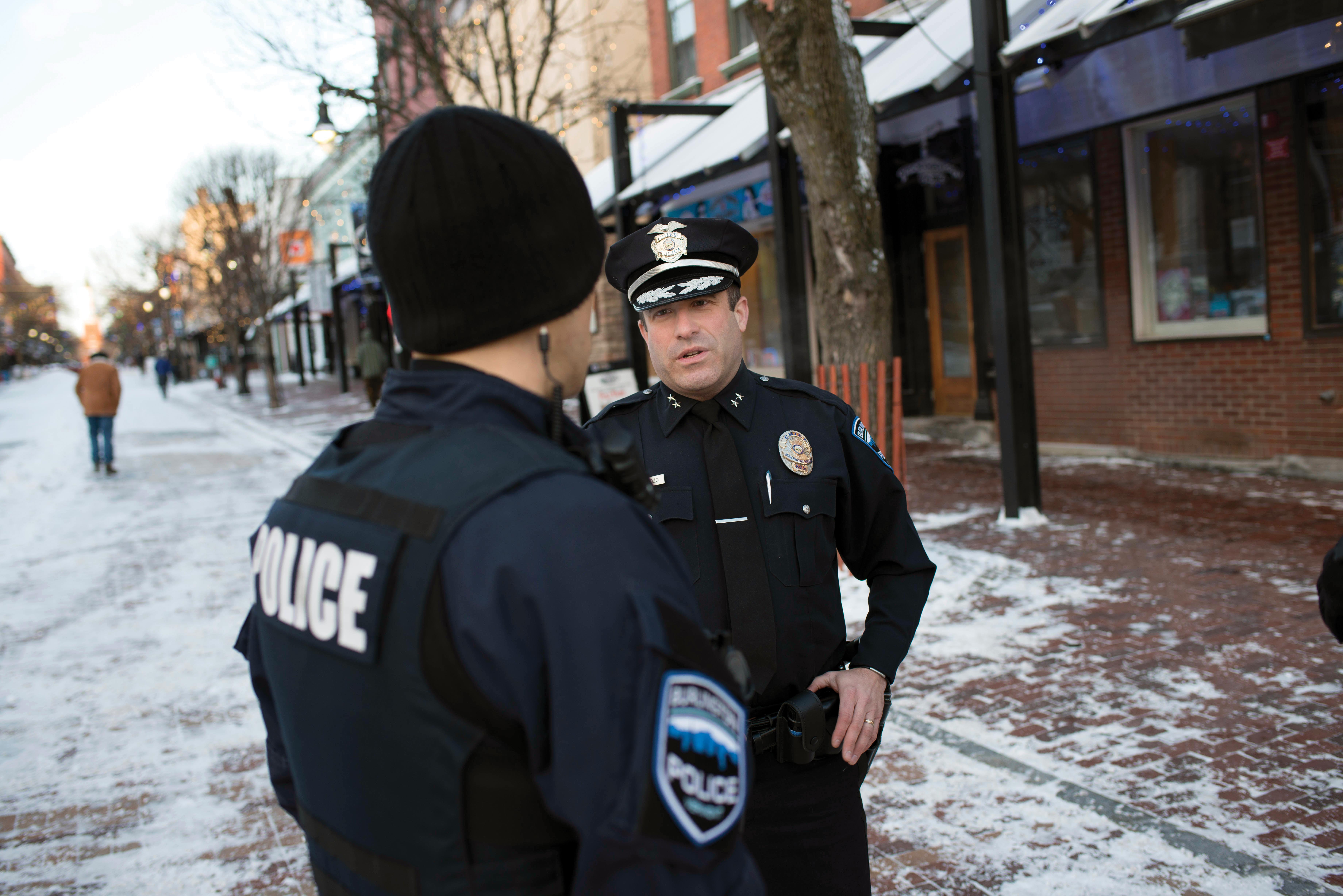
Del Pozo hopes Burlington, Vermont’s largest city, will become one of the leaders in reducing the need for lethal force in American policing, something he became quite familiar with last year. Less than a year after his swearing in, del Pozo faced a backlash from the community he was appointed to protect after one of his officers shot a man suffering from mental illness.
Last March a group of Burlington officers responded to a call about Ralph “Phil” Grenon, a resident suffering from paranoid schizophrenia with whom they were already familiar. For five hours the officers tried to reason with Grenon, who had stopped taking his medication for several months. When Grenon finally approached the officers wielding two large knives, officers were unable to subdue him with a Taser. He was shot multiple times by one officer and killed. Del Pozo was on the scene, standing a few feet away, when the shooting occurred.
The incident sounds familiar, but del Pozo’s response was not. The shooting was deemed legally justified—investigators quickly cleared the officers of any wrongdoing—and del Pozo immediately gave a press conference and released body-cam footage of the incident in the name of transparency. He also said the shooting was a failure on their part.
“[At the time], compared to other larger agencies, we had fewer nonlethal tactical resources. But that’s no different than countless other agencies within Vermont. Within those constraints, the cops did everything exactly right,” del Pozo says. “So it really became a meta question about how we can create a police department that has more options and can forestall lethal encounters like that.”
Burlington has since become one of six pilot sites for testing some strategies outlined by the Police Executive Research Forum, a Washington, D.C.-based think tank. The group’s recently published report, “Guiding Principles On Use of Force,” includes 30 principles and suggestions to reduce unnecessary force when a suspect does not have a firearm. They include adopting a policy of de-escalation, documenting use-of-force incidents, training officers in communication techniques and equipping officers with less-lethal weapons and protective shields.
Del Pozo has trained his officers in new de-escalation techniques and is working on outfitting officers with tools and resources they need to avoid the use of force. He’s even piloted a program that incorporates civilian outreach teams that listen to radio frequencies used by the department and can respond to crises involving people with mental illness if they know them or have worked with them before.
Del Pozo is also taking the lead against Vermont’s infamous opioids epidemic. Chittendon County alone saw 16 overdoses from opioids, including heroin, fentanyl and prescription drugs, last year. Nationwide, opiates deaths surpassed gun deaths for the first time. In response, del Pozo outfitted his cruisers with naloxone, a drug that can prevent someone from overdosing. But he emphasizes that the ubiquity of the antidote alone will not solve the drug problem. “We’ve reached the saturation point in many areas, where naloxone is everywhere but overdoses are still going up. It’s a full-blown crisis,” he says. Del Pozo is tackling the issue aggressively: His new opioid policy coordinator is leading a community-wide initiative with health departments, medical providers and other organizations to combat the drug problem.
While he hopes to set a national example on these larger issues, del Pozo has never compromised on community policing. To improve his department’s relationship with the community, he reaches out to its leaders; publishes data on police traffic stops, which can be scoured for evidence of racial bias; and is actively recruiting new officers to better reflect the diversity of the city’s residents.
“There’s this false dichotomy in America that you either have to choose the narrative of excessive urban crime or choose the narrative of brutal police, and that you’re either on the black lives matter side or the blue lives matter side,” he says. “It’s a false dichotomy. Police can improve what they do and improve the services they deliver and lower the force that they use, without having to say that all police are troubled or racist or undemocratic and without saying that there isn’t serious crime in urban America that you need to police out.”
Del Pozo also capitalizes on the power of social media, particularly Facebook and Twitter. In 2014 he helped get every precinct in New York City on Twitter, and he now manages the Twitter account for the Burlington police. “The idea behind it is you have to go to where the people are. Police can’t expect citizens to always be coming to us for interactions, and if we’re not on social media there’s going to be this whole conversation happening out there that we’re not a part of,” he says.
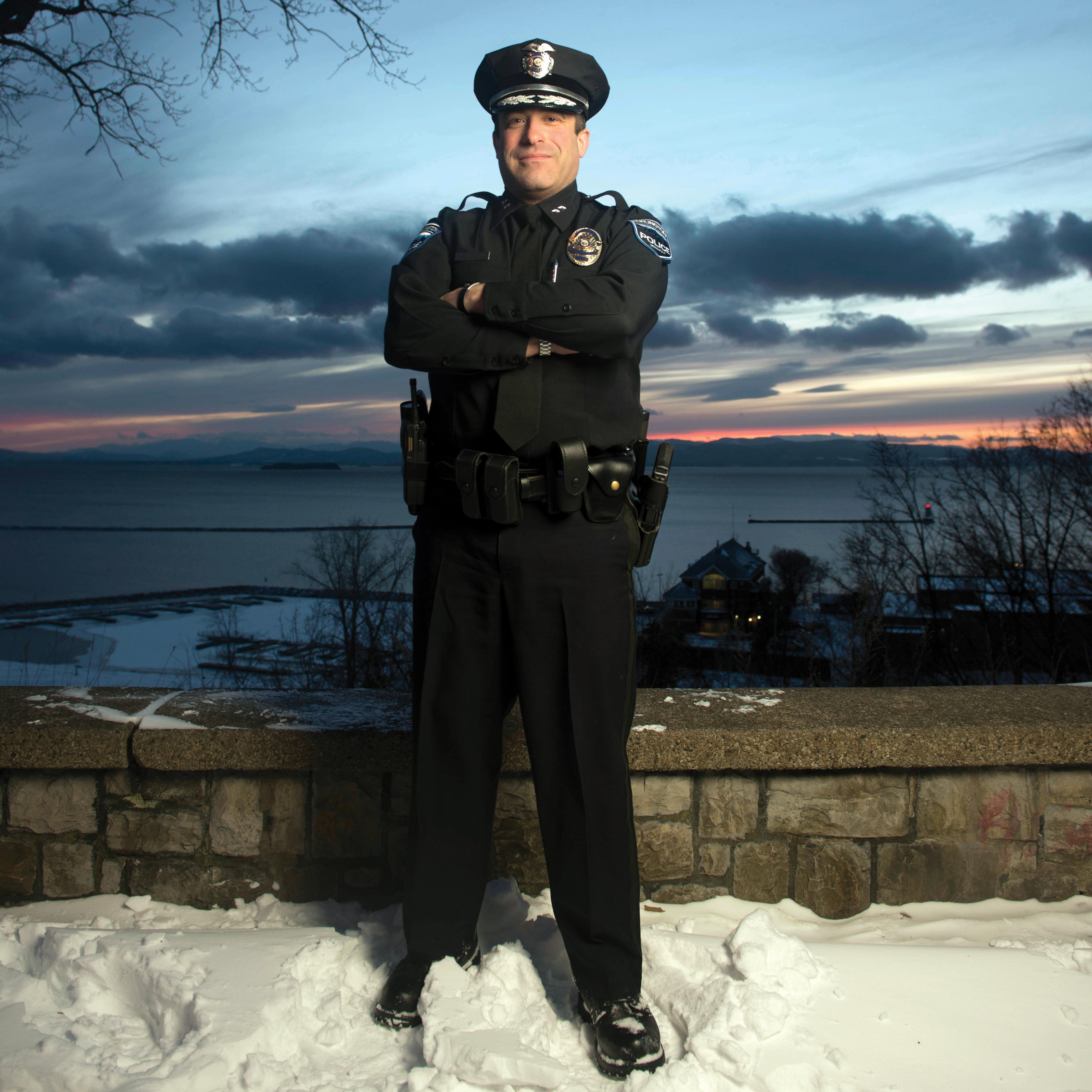
When the Rite Aid on Cherry Street put off painting over graffiti on one of its walls, for example, del Pozo leveraged social media. The wall was covered with graffiti and grease from people constantly drinking and hanging on the corner. Del Pozo assigned an officer to the block until it was cleared of lawbreakers. But when he asked Rite Aid to clean the wall, they demurred. “So we found a local volunteer to power-wash the wall and mentioned Rite Aid in a tweet, saying if you’re not going to clean it, we’ll do it ourselves,” he says. “Rite Aid corporate reached out to us on Twitter and a few weeks later they painted the wall.”
His efforts haven’t gone unnoticed. Chuck Wexler, executive director of the Police Executive Research Forum, says del Pozo’s candor, forthrightness and ability to think outside the box made him a natural candidate for the forum’s top leadership and innovation award, which it gave to del Pozo last May. “Brandon is one of the up-and-coming bright stars in the future of American policing,” Wexler says. “He’s not afraid to question conventional thinking, do the research and implement policies that will make a difference in the complicated society we live in. These are qualities that are going to be necessary for tomorrow’s police leaders.”
Del Pozo stands out in other ways, too. For one, he has a persistent creative streak. As an undergrad he wrote columns for The Dartmouth and is currently working on a book on policing that will be published by Farrar, Straus and Giroux, a division of MacMillan. In 2014, del Pozo wrote and directed Sunday 1287, a lightly fictionalized depiction of a murder he encountered in New York City [view the film online here]. It was screened at the Middlebury New Filmmakers Festival in August. “I was worried people and the actors involved wouldn’t take the project seriously when they found out I was a cop, but that wasn’t the case at all,” he says.
Last year del Pozo also wrote a piece for this magazine, in which he chronicled his love for the White Mountains. He ultimately summited all 48 of the peaks in New Hampshire that rise more than 4,000 feet, the final two (Mount Isolation and Galehead Mountain) with his then 7-year-old son after returning to New England. “It’s amazing what you can get a boy to do when you promise to buy him the small stuffed dog he’s been pining for,” he wrote.
His fondness for the area, cultivated during and after Dartmouth, when he returned to train at the Army Mountain Warfare School in Jericho, Vermont, made the job all the more appealing. “I love ice climbing, rock climbing, cross-country skiing and downhill skiing,” he says. “I’ve honestly seen some of the most beautiful sunsets of my life here.” And he still has outdoor goals: He says he hopes to lead his wife in an ice climb up Chouinard’s Gully, in the Adirondacks.
He also spends time giving back to Dartmouth. Last year he gave a lecture for a cross-disciplinary seminar called “#BlackLivesMatter,” during which he spoke about his experience dealing with policing and race for the NYPD. He hopes that more Dartmouth grads will go into policing. “If you want to go right to the heart of the issues people are wrestling with in American cities today, being a police officer is going to take you there and hold you there faster and longer than anything else you can do with your time. And it requires courage,” he says. “Anyone who says you’re too smart to be a cop doesn’t understand what it means to be smart and doesn’t understand policing.”
So far del Pozo has convinced at least one other alum to follow his path. Matt Delaney ’99 is currently an NYPD special operations lieutenant in Brooklyn. After 9/11 he reached out to del Pozo to learn more about the job. Del Pozo told him of his experiences over dinner, and Delaney ultimately joined the NYPD.
“He’s a great storyteller and talked about their service and camaraderie. It sounds corny, but he emphasized the idea of giving back and a great sense of adventure to policing,” Delaney says.
Del Pozo hasn’t made a run for political office since losing his 1995 bid to become president of student assembly. But there are those who think that wasn’t his last campaign. He says politics isn’t in his plans, but it’s something residents of Burlington ask him about frequently. An appointed (rather than elected) official, del Pozo is regularly recognized on the street. “That really surprised me,” says his wife, Sarah. “I have never lived anywhere else where people, even teenagers, recognized the chief of police.” She wouldn’t be opposed to her husband pursuing a political future, she adds. He is obviously comfortable working with politicians and running in their circles—he works closely with mayor Miro Weinberger and recently met with U.S. House Speaker Paul Ryan about use-of-force reform.
For now though, del Pozo says his focus is on keeping Burlington safe and implementing preventive measures to reduce unnecessary use of force. One of his goals for the year is to outfit an emergency response truck—modeled after those in New York City—with the tools necessary for de-escalation and a team well versed in those techniques.
“This truck more than anything expresses the challenges and promise of American policing. I want it to be driven by two cops who are trained in crisis intervention and negotiation and de-escalation. But it will also have a tremendous inventory in the back of shields and y-bars and beanbag guns and water cannons and rope and power tools and everything we need,” he says. “The people in the truck will have the proficiency to employ all the equipment to get a person out of a difficult situation without hurting them. I hope it will cause other police agencies to think about some ways they can do their job without hurting other citizens if they don’t have to.”
Tiffanie Wen is a freelance writer who has written for the BBC, The Atlantic and The Daily Beast. She’s currently based in Lebanon, New Hampshire.
Click here to read an exclusive excerpt from del Pozo’s forthcoming memoir.
